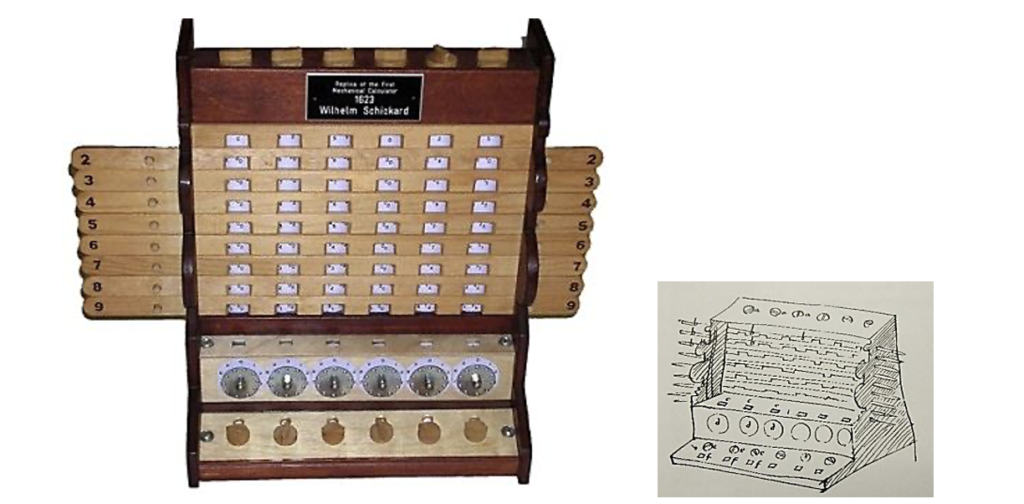Calculating Clock of SCHICKARD 1623 (Replica)
Inventor
Wilhelm SCHICKARD
Invention date
1623
Manufacturing date:
Copy from 1990
Manufacturing location
Unknown
Manufacturer
Unknown
Dimensions
L 15 H 32 W 5
Reference Number
001

Drawing from W.SCHICKARD
History and Functionality
The German Wilhelm SCHICKARD (1592-1635) is known as an Orientalist, mathematician, and astronomer… He taught at the University of Tubingen in Germany. It is commonly believed that Wilhem SCHICKARD invented the first mechanical machine. He would have designed it to help his friend astronomer Johannes KEPLER in performing his calculations. Wilhelm SCHICKARD named his machine: “calculating clock”. He seems to have only wanted to satisfy his personal curiosity.
The only copy of this machine was built in 1623 and disappeared in a fire on February 22, 1624. It was reconstructed from the plans that W. SCHICKARD sent to his friend Johannes KEPLER. We owe the first reconstruction of this machine to Baron Von Freytag LÖRINGHOFF, Professor at Tubingen in 1960.
The machine consists of two parts: the upper part is composed of vertical rollers and uses the principle of Napier rods to enable multiplication. A slider system allows you to display only the selected numbers.
In the lower part you find an adder with an automatic ten-carry mechanism. This carry mechanism uses single cog wheels fixed to the unit wheels. It must be operated with a stylus. The buttons at the bottom of the machine are only used to save numbers.
About The Inventor
Wilhelm Schickard was a German polymath of the early 17th century, renowned primarily for designing one of the earliest known mechanical calculators. His pioneering creation, the “Calculating Clock,” predates the more famous Pascaline by Blaise Pascal by over two decades.
Schickard’s device was capable of performing basic arithmetic operations, such as addition and subtraction, and was an early forerunner to the modern calculator. Although his work in this area was not widely recognized during his lifetime, it significantly contributed to the development of computational technology.
In addition to his work in computing, Schickard was also accomplished in other fields, including astronomy, cartography, and Hebrew studies, demonstrating a diverse and profound intellectual capability.
His multifaceted contributions have earned him a notable place in the history of science and technology.

